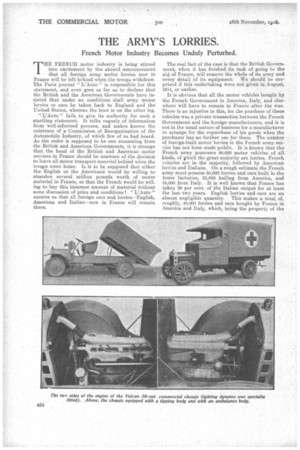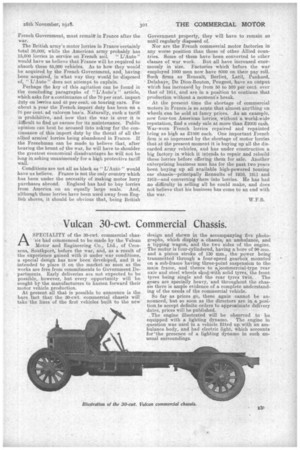THE ARMY'S LORRIES.
Page 14

Page 15

If you've noticed an error in this article please click here to report it so we can fix it.
French Motor Industry Becomes Unduly Perturbed.
THE FRENCH motor industry is being stirred into exciterisent by the absurd announcement • that all foreign army motor lorries now in France will be left behind when the troops withdraw. The Faris journal " L'Aute " is responsible for this statement, and even goes as far as to declare that the British and the American Governments have insisted that under no conditions shall army motor lorries or cars be taken back to England and the United States, whereas the boot is on the other lvg.
"L'Auto " fails to give its authority for such a startling statement. It talks vaguely of information from well-informed persons, and makes known the existence of a Commission of Reorganization of the Automobile Industry, of which few of us bad heard. As the order is supposed to be one emanating from the British and American Governments, it is strange that the head of the British and American motor services in France should be unaware of the decision to leave all motor transport material behind when the troops come home. Is it to be supposed that either the English or tho Americans would be willing to abandon several million pounds worth of motor material in France, or that the French would be willing to buy this immense amount of material without some discussion of price and conditions? " L'Anto " assures us that all foreign cars and lorries—English, American and Italian—now in France will remain there. The real fact of the case is that the British Governments when it has finished its task of going to the aid of France, will remove the whole of its army and every detail of its equipmentWe should be surprised if this undertaking were not given in August, 1914, or earlier.
It is obvious that all the motor vehicles bought. by the French Government in America, Italy, and elsewhere will have to remain in France after the war. There is no injustice in this, for the purchase of these vehicles was a private transaction between the French Government and the foreign manufacturers, and it is not in the usual nature of business for a manufacturer to arrange for the repurchase of his goods when the purchaser has no further use for them. The number of foreign-built motor lorries in the French army service has not been made public. It is known that the French army possesses 90,000 motor vehicles of all kinds, of syhicb the great majority are lorries. French vehicles are in the majority, followed by American Jorrles and Italians. On a rough estimate the French army must possess 50,000 lorries and cars built in the home factories, 25,000 hailing from America, and 15,000 from Italy. It is well known that France has taken 20 per cent, of the Italian output for at least the last two years. English lorries and cars are an almost negligible quantity. This makes a total of, roughly, 40,000 lorries and ears bought by France in America and Italy, which, • being the property of the French Government, must remain' in France after the war.
The British army's motor lorries in France certainly total 30,000, while the American army probably has 15,000 lorries in service on French soil. " L'Auto " would have us believe that France will be required to absorb these 85,000 vehicles. As to how they would be acquired by the French Government, and, having been acquired, in what way they would be disposed of, " L'Auto " does not attempt to explain.
Perhaps the key of this agitation can be found in the concluding paragraphs of "I/Auto's " article, which asks for a continuance of the 70 per cent, import duty on lorries and 45 per cent, on touring cars. For about a year the French import duty has been on a 70 per cent, ad valorem basis. Naturally, such a tariff is prohibitive, and now that the war is over it is difficult to find an excuse for its maintenance. Public opinion can best be aroused into asking for the continuance of this import duty by the threat of all the allied armies' lorries being abandoned in France. If the Frenchman can be made to believe that, after bearing the brunt of the war, he will have to shoulder the greatest economical disadvantages he will not be long in asking unanimously for a high protective tariff wall.
Conditions are not all as black as " L'Auto " would have us believe. France is not the only country which has been under the necessity of making motor lorry purchases abroad. England has had to buy lorries from America on an equally large scale. And, although these lorries have been used away from English shores, it should be obvious that, being British Government property, they will have to remain so until regularly disposed of.
Nor are the French commercial motor factories in any worse position than those of other Allied countries. Some of them have been converted to other classes of war work. But all have increased enor • mously in size. Factories which before the war employed 1000 men now have 8000 on their pay roll. Such firms as Renault, Berliet, Latil, Panhard, Delahaye, De Dion-Bouton, Peugeot, have an output • which has increased by from 50 to 500 per cent. over that of 1914, and are in a position to continue that production without a moment'sbreak.
At the present time the shortage of commercial motors in France is so acute that almost anything on wheels can be sold at fancy prices. As an example, new four-ton American lorries, without a world-wide reputation, find a ready sale at more than 22000 cash. War-worn French lorries repaired and repainted bring as high as 21800 each. One important French firm is so impressed by the shortage of motor lorries that at the present moment it is buying up all the discarded army vehicles, and has under construction a big factory in which it intends to repair and rebuild these lorries before offering them for sale. Another enterprising business man has for the past two years been buying up all available high-powered touring ear chassis—principally Renaults of 1910, 1911 and 19I2—and converting them into lorries. He has had no difficulty in selling all he could make, and does not believe that his business has come to an end with the war.
W.F.B.






















